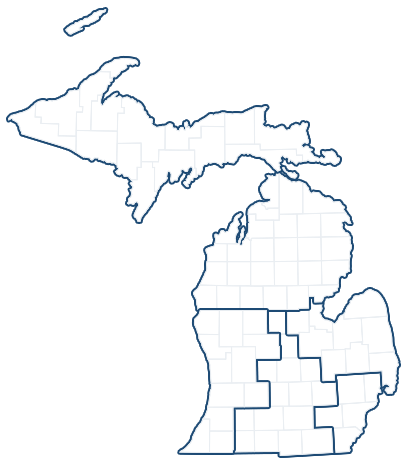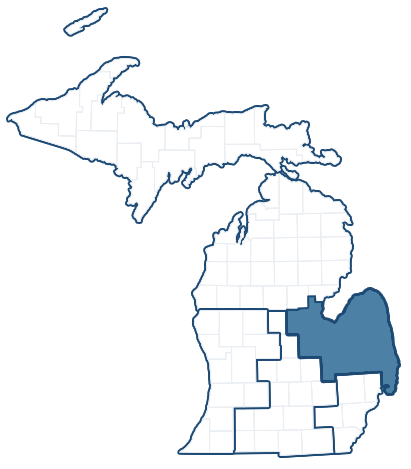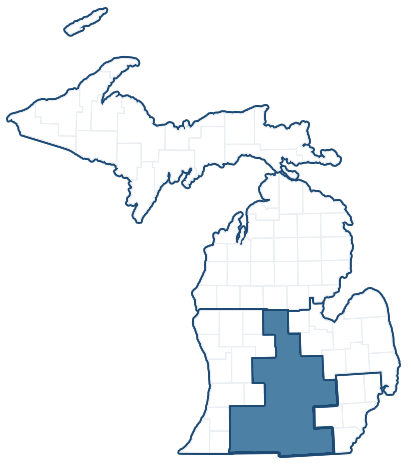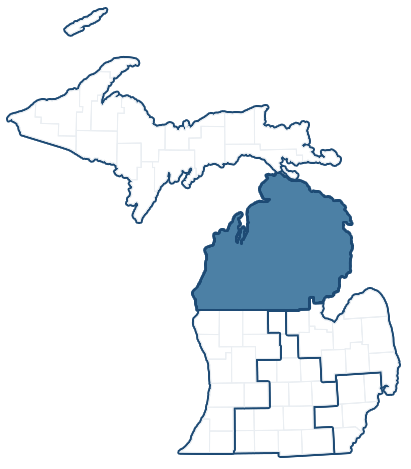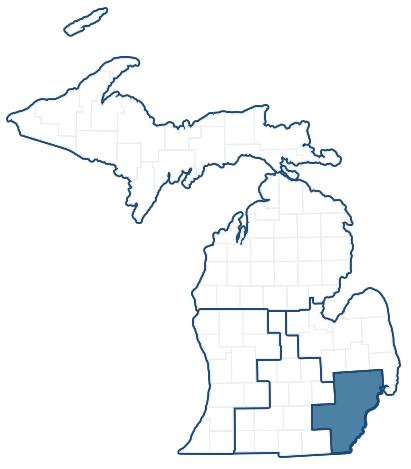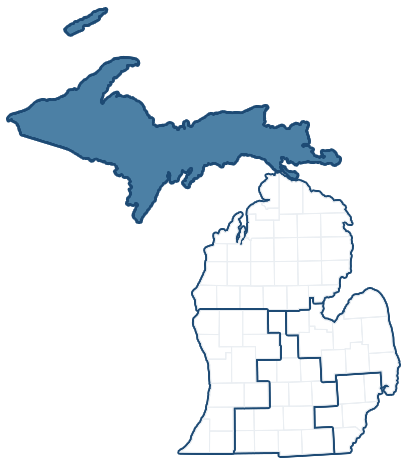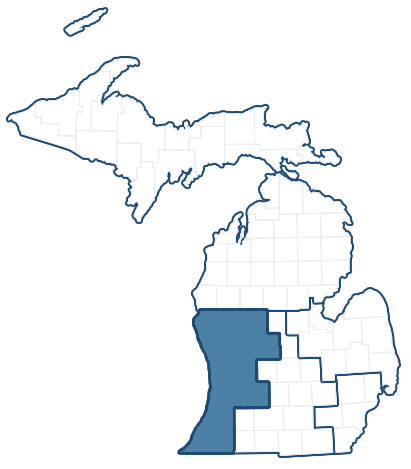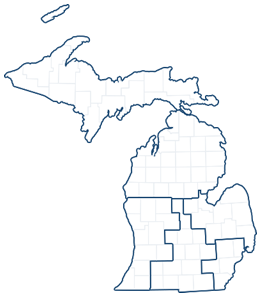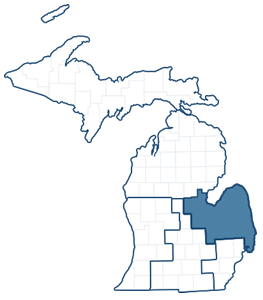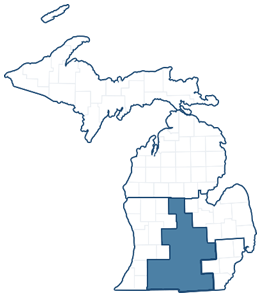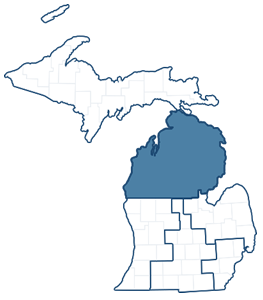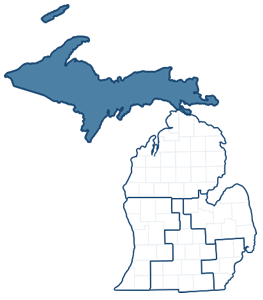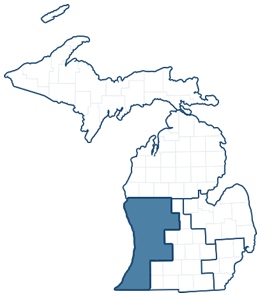Great Lakes Lawmakers Introduce Legislation to Extend Great Lakes Protections
Bipartisan Bill Extends the Great Lakes Restoration Initiative and Increases Funding Levels
Tuesday, February 06, 2024WASHINGTON, D.C. – Today, members of the Great Lakes Task Force – led by Senators Debbie Stabenow and J.D. Vance in the Senate and Representatives David Joyce, Marcy Kaptur, Bill Huizenga, and Debbie Dingell in the House – introduced the bipartisan Great Lakes Restoration Initiative Act of 2024, which extends this critical program for another five years through 2031, and increases annual funding levels from $475 million in 2026 to $500 million from 2027 through 2031.
The Great Lakes Restoration Initiative (GLRI) is the most significant investment ever made to restore and protect our Great Lakes. Senator Stabenow first authored this flagship public-private program in 2010. Support for this popular initiative includes both Democrats and Republicans. In the Senate, the bill is sponsored by Senator Debbie Stabenow, Senator J.D. Vance, Senator Amy Klobuchar, Senator Todd Young, Senator Gary Peters, Senator Tammy Duckworth, Senator Sherrod Brown, Senator Tammy Baldwin, Senator Dick Durbin, Senator Kirsten Gillibrand, Senator Tina Smith, Senator John Fetterman, Senator Chuck Schumer, and Senator Bob Casey. House sponsors include Representative David Joyce, Representative Marcy Kaptur, Representative Bill Huizenga, Representative Debbie Dingell, Representative Gwen Moore, Representative Jack Bergman, Representative John Moolenaar, Representative Claudia Tenney, Representative Bryan Steil, Representative Haley Stevens, Representative John James, Representative Max Miller, Representative Brad Schneider, Representative Elissa Slotkin, Representative Lisa McClain, Representative Raja Krishnamoorthi, Representative Joseph Morelle, and Representative Mike Quigley.
“The creation of the Great Lakes Restoration Initiative is one of the most important actions of my legislative career. Since I authored the program in 2010, it has been a proven success story,” said Senator Stabenow, Co-Chair of the Senate Great Lakes Task Force. “This bill will ensure the stability and future of the program as we address new emerging threats to our Great Lakes and waters.”
“The Great Lakes are an invaluable asset to the people of Ohio – I’m proud to partner with Senator Stabenow on legislation that will continue to protect them for generations to come. The Great Lakes Restoration Initiative delivers the tools we need to fight invasive species, algal blooms, pollution, and other threats to the ecosystem. This is a commonsense, bipartisan effort that I encourage all of my colleagues to support,” said Senator Vance, Co-Chair of the Senate Great Lakes Task Force.
“Lake Superior provides Minnesotans with clean drinking water, habitat for local wildlife, and opportunities for outdoor recreation,” said Senator Klobuchar, Vice-Chair of the Senate Great Lakes Task Force. “This bipartisan legislation will allow the Great Lakes Restoration Initiative to continue addressing environmental concerns like pollution and invasive species so that Minnesotans can continue to enjoy the Great Lakes for years to come.”
“The Great Lakes are an important part of Indiana’s ecosystem and economy,” said Senator Young, Vice-Chair of the Senate Great Lakes Task Force. “The Great Lakes Restoration Initiative is a results-driven program that addresses the most serious issues threatening the wellbeing of the Great Lakes basin, including toxic substances, pollution, debris, and invasive species. Reauthorizing this program will continue to protect and preserve these lakes for generations to come.”
“The Great Lakes Restoration Initiative is a proven success, from combatting harmful invasive species to restoring vital waterways and habitats,” said Senator Peters. “We must ensure that it has the resources needed to continue strengthening the Great Lakes for future generations. As a Michigander, I know how critical the Great Lakes are to our state’s economy and way of life, so I’m proud to again help lead the charge to protect this important program.”
“Maintaining the health of our Great Lakes is critical to protecting our environment, supporting a robust fishing industry and supporting the health of our communities throughout the Midwest and beyond,” Senator Duckworth said. “By reauthorizing the Great Lakes Restoration Initiative, we’re working to ensure we have the federal support needed to keep our Great Lakes clean and protect this critical resource for generations to come.”
“Lake Erie provides drinking water for 11 million people. We must do all we can to keep it healthy for them, and for the businesses, families, boaters, and anglers that rely on the lake,” said Senator Brown. “The Great Lakes Restoration Initiative is one of our most successful environmental efforts, it’s vital to Ohio’s economy, and thanks to the Bipartisan Infrastructure Law, it’s more effective than ever. We must keep it going and ensure the protection of Lake Erie and its tributaries for today and for the next generation.”
“Wisconsin’s Great Lakes are integral to our state’s identity and our Made in Wisconsin economy. When we invest in restoring and preserving these invaluable resources, we are investing in the health and economic future of Wisconsin families,” said Senator Baldwin. “Whether it’s transporting goods, attracting tourists and outdoor enthusiasts to cities across the state to recreate, or providing a safe source of drinking water for Wisconsinites, we rely on Lake Michigan and Superior to keep our state moving forward. I am proud to once again lead this bipartisan legislation that carries on Wisconsin’s legacy of responsible stewardship and ensures generations to come can enjoy America’s Fresh Coasts.”
“The Great Lakes Restoration Initiative is a successful program that protects one of the Midwest’s most valuable resources. It is vital that we continue to invest in this initiative for years to come,” said Senator Durbin. “I’m joining my colleagues today to reauthorize the Great Lakes Restoration Initiative and ensure that our region has the resources to care for our lakes.”
“The Great Lakes are an important natural, economic and recreational resource for New York. Not only must we protect the quality of the Great Lakes and connected waterways, but we must strengthen and improve them. The Great Lakes Restoration Initiative is a massive, multi-state investment in the future of the Great Lakes; it devotes significant resources and funding to ecosystem revitalization, which will simultaneously protect our natural resources and create jobs. I am encouraged by the progress that Great Lakes Restoration Initiative has already made and I will partner with my colleagues from New York and surrounding states to reauthorize it and continue laying the foundation for a greener, cleaner future,” said Senator Gillibrand.
“Lake Superior plays a critically important role in our state, as an economic driver for tourism and shipping, and culturally for the Native American communities who have long lived near it,” said Senator Smith. “The Great Lakes Restoration Initiative has helped restore and protect the Great Lakes for more than a decade. Continued federal support for this program will help ensure the lake’s water quality remains healthy and vibrant by supporting projects like those that restore vegetation near the lake and reduce phosphorus runoff from nearby agricultural land. The grants could also fund projects to install green infrastructure in shoreline communities, such as permeable pavement. I look forward to continuing our work to protect and strengthen the Great Lakes for years to come.”
“Erie is one of my favorite cities in our Commonwealth, a hub of manufacturing and the bellwether county of Pennsylvania. I will always support any initiative to restore and protect Lake Erie and Presque Isle and I am proud to cosponsor the reauthorization of this great program and continue to invest in this critical region,” said Senator Fetterman.
“The Great Lakes are the crown jewel of Upstate NY’s natural beauty and a vital source of drinking water, recreation, tourism and commerce – and thanks to the historic $1 billion I secured in the bipartisan Infrastructure & Jobs Law, we are getting federal resources flowing to restore and protect these essential waterways. Restoring our Great Lakes is not only vital to combatting climate change and cleaning up our environment, but necessary to ensure these lakes can serve our state’s booming tourist economy, which is why we must act now and reauthorize this vital program” said Senator Schumer. “From the shores of Lake Erie to the scenic rivers flowing from Lake Ontario, this Initiative has helped clean up our waterways, restore fish habitat, and protect our environment and we must reauthorize the program so we can continue supporting the Great Lakes. Investing in this program means investing in the future of New York and I will continue fighting to ensure we have the federal resources to protect our Great Lakes and the natural beauty of New York’s waterways.”
“The Great Lakes provide more than 1.5 million jobs, supply 90 percent of our nation’s fresh surface water, and generate $62 billion in wages every year,” said Congressman Dave Joyce, Co-Chair of the House Great Lakes Task Force. “The Great Lakes Restoration Initiative supports efforts that confront direct threats facing the lakes like harmful algal blooms, water pollution, invasive species, and coastal erosion. I am proud to be working with my colleagues on both sides of the aisle to reintroduce this critical legislation to protect and preserve the national treasure that is the Great Lakes ecosystem.”
“As a co-chair of the Congressional Great Lakes Task Force and a member of the House Committee on Appropriations, funding the Great Lakes Restoration Initiative (GLRI) is among my top priorities each year,” said Congresswoman Marcy Kaptur, Co-Chair of the House Great Lakes Task Force. “The GLRI provides instrumental funding to meet an enormous unmet need for our region, including the millions of people who depend on the Great Lakes for their drinking water, livelihoods, and leisure. In 2020, the GLRI contributed $3.1 Trillion to our economy, 25.8 million jobs, and $1.3 Trillion in wages. Analysis shows that every GLRI dollar spent produces $3.35 in economic activity, which demonstrates a clear return on investment. Robust funding that benefits communities throughout our region is just common sense.”
“As Co-Chair of the House Great Lakes Task Force, I have worked to build a bipartisan coalition in Congress to make the Great Lakes a national priority,” said Congressman Bill Huizenga, Co-Chair of the House Great Lakes Task Force. “The Great Lakes serve as a vital source of economic activity, recreation, and drinking water for millions of Americans. For us in Michigan, the Great Lakes are a way of life. Studies from Grand Valley State University and the University of Michigan demonstrate how the economic health of the Great Lakes is directly tied to their ecological health. The Great Lakes Restoration Initiative is the leading federal program designed to clean up legacy pollution, restore habitats, and combat invasive species across the basin. I will continue to lead efforts that prioritize the Great Lakes and work to protect, preserve, and strengthen these precious resources for future generations.”
“The Great Lakes are not only an important natural resource, but a way of life that supports communities and jobs across our region and country. Since it was established, the Great Lakes Restoration Initiative has been an environmental and economic success, and is fundamental to protecting, restoring, and maintaining the Great Lakes ecosystem and economy. We must ensure the GLRI receives strong, bipartisan support to continue this meaningful work,” said Congresswoman Debbie Dingell, Co-Chair of the House Great Lakes Task Force.
"In Michigan, we are the stewards of the Great Lakes, because they are the backbone of our economy and our way of life," Congresswoman Elissa Slotkin said. "We may not always think about it when we're enjoying our beautiful lakes, but protecting and maintaining our Great Lakes takes investment and commitment — and the Great Lakes Restoration Initiative has been instrumental over the years in keeping our lakes clean and safe in order to power our state and our economy. This bill reauthorizes the initiative for another five years and I'm thrilled to see it continue to receive strong, bipartisan support.”
“The Great Lakes Restoration Initiative (GLRI) has been one of the most beneficial programs for the Great Lakes and the Great Lakes State. The Midwest is home to the world’s largest source of freshwater, and the GLRI has helped our nation to preserve our abundant natural resource. I am proud to join the efforts to extend the GLRI,” said Congressman John James.
“Rochester’s unique position along the Great Lakes holds significant economic potential and recreational opportunity for our shoreline communities, and it’s critical we do everything in our power to protect these outstanding natural resources,” said Congressman Joe Morelle. “I’m proud to join in supporting this legislation to bolster the Great Lakes Restoration Initiative and combat ongoing and future threats to the resiliency of our Great Lakes. I look forward to continuing my work with colleagues on both sides of the aisle to protect our environment and natural resources for generations to come.”
“The Great Lakes Restoration Initiative is essential to ensuring the health and safety of our freshwater for generations to come,” said Congresswoman Haley Stevens. “Michiganders rely on the Great Lakes and the ecosystems they support. They are vital to our communities and our economy, that’s why I’m proud to support this legislation, because every community deserves fresh water and it’s our responsibility to protect it.”
“Those of us who call Michigan home know the importance of our water and the need to protect, preserve, and restore this treasured natural resource. Michigan’s First District has the most Great Lakes shoreline of any Congressional District in our nation, and this legislation is another strong step forward to ensure our Great Lakes remain great. I am proud every year to work with colleagues on both sides of the aisle and in the House and Senate to support and advocate for continued Great Lakes Restoration Initiative funding,” said Congressman Jack Bergman.
“The collaborative efforts of the Great Lakes Restoration Initiative bring together vital resources to address some of the top priorities for Ohio's Lake Erie and its sister Great Lakes,” said Congressman Max Miller. “The GLRI has been a tremendous success so far, and I’m excited to join the effort to continue strengthening our coastal communities and resources throughout the Great Lakes.”
"Lake Ontario plays a vital role to our NY-24 community, bolstering our local economy and enriching our surroundings with its natural beauty," said Congresswoman Claudia Tenney. "The Great Lakes Restoration Initiative facilitates crucial investments to preserve and safeguard our nation's cherished Great Lakes. I am eager to continue supporting legislation that invests in and fosters the prosperity of Lake Ontario, ensuring it continues to be an invaluable resource for our lakefront communities for generations to come."
The legislation also shares broad support among Great Lakes advocates, including: Healing Our Waters-Great Lakes Coalition, Great Lakes Commission, Alliance for the Great Lakes, League of Conservation Voters, National Wildlife Federation, Sierra Club, National Parks Conservation Association, The Nature Conservancy, National Audubon Society, American Sportfishing Association, Theodore Roosevelt Conservation Partnership, Great Lakes Fishery Commission, American Great Lakes Ports Association, Environmental Law & Policy Center, Great Lakes Business Network, Citizens Campaign for the Environment, Michigan League of Conservation Voters, Clean Wisconsin, Save the Dunes, Ohio Environmental Council, Ducks Unlimited and Western Reserve Land Conservancy.
The Great Lakes Restoration Initiative has focused federal and nonfederal efforts to stop the spread of carp and other invasive species, restore coastline and habitats connecting our streams and rivers, clean up environmentally damaged Areas of Concern, and prevent future contamination.
The Great Lakes and its watersheds continue to be stressed by contamination and threats to water quality, and are under increasing pressure from new invasive species, climate change, erosion, and habitat destruction. The Great Lakes Restoration Initiative ensures that vital efforts to protect our water can continue and that we can address new and emerging threats to our lakes and waterways.
###
Next Article Previous Article



